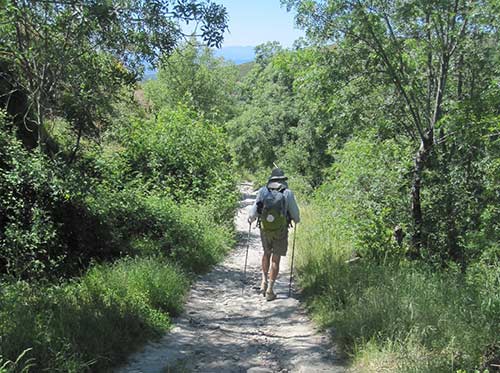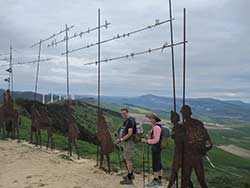
I think all of us have had a go at being a tourist. We go somewhere we haven’t been before, and there’s often a list of touristy things to do. In Christchurch it’s probably ride the tram, go to the Restart Mall, go on a punt. Tourists often do things that locals generally do not do. I’ve lived in Christchurch most of my life – I’ve never been on a punt on the Avon.
I think we all know what a tourist is – you know, visiting Europe 10 cities in 10 days; if it’s Tuesday then this must be Brussels.
A tourist often wants to be in a different place to home but have things similar or better than home. No weird foods please – my stomach might get upset. If it’s hot, travel in an air-conditioned bus and stay in an air-conditioned hotel. If it’s cold, put the heaters on in the bus; and in the hotel. It’s a bit like a TV programme about the place you are visiting, but wearing 3D glasses.
So I’ve been a tourist. I’d like to distinguish being a tourist from travelling. Travelling is quite different to being a tourist. You don’t try and insulate yourself from the local experiences; in fact you want to immerse yourself in the local reality as much as possible: speak their language, eat their food, live as much as you can like they live for the time you are there.
So there’s tourist, there’s traveller, and there’s being on a journey. The dictionary definition of being on a journey is “traveling from one place to another” and it adds “usually taking a rather long time”. So being on a journey is like travelling, but it adds a new component – a destination. You are going somewhere – from one place to another.
Travelling is focusing on where you are now, in fact trying to really experience where you are now (and that makes it different from tourism which much more tries to insulate you from where you are now). The journey is not losing the importance of really experiencing where you are now – but adds, as well, that you have an ultimate destination – your travel is going somewhere.

And, once again, I hope you’ve noticed several levels here. In your life are you a tourist, trying to insulate yourself from what is actually happening, trying to distract yourself from reality? In your life are you a traveller – being fully present in the moment, in this moment? Is your life a journey – are you present this moment and also are you clearly headed somewhere? Is your life a pilgrimage – reverencing every moment, and with an ultimate sacred destination?
This is another post in the series on my walking the Camino.
If you appreciated this post, consider signing up for a not-very-often email, and/or like the liturgy facebook page…



What a wonderful experience, Bosco. I think the key here is that you were walking. This does seem to connect one to the grounded ordinariness of being in a place. I travel a lot for work and spend most of my time in planes, hotels and offices. But on the odd occasion when I have some free time I walk, finding out a host of ordinary things about what it might be like to live in that place. Whether it’s the intense heat of the natural day, the fact that walkers have to negotiate ditches and poorly regulated traffic to cross a road, the smells of drains and streetside food, the intense colours of exotic fruit and the relentless noise of the trucks going by, to give just an hour’s example of walking in downtown Yangon recently. These are the experiences that stay with me when travelling, and bring me closer to others, to God and to simply being.
A good point about walking, Julianne. Blessings.
Thanks, Bosco, for your reflections on your recent pilgrim journey to Santiago de Compostella – an epic journey indeed, and surely a wonderful way of testing one’s commitment to a particular quest. Why should our Muslim brothers and sisters have all the thrill of being on a journey of pilgrimage?
I guess an important part of our pilgrim journey here on earth is an inward progression – our journey into Christ. Having been ‘born anew’ of Christ in our Baptism, we seem to spend the rest of our lives finding our way back to Him. My journey is very much a Eucharistic quest – looking for the presence of Christ in the various celebrations of His Presence in the Mass. Sometimes, I experience the pressure of His Presence to a greater degree than at other times. I guess this is all part of the willingness to seek – so that we may find. Good to see you back on the web!
Thanks, Fr Ron. Yes, I will have more to say about your key point: the inner quest. Blessings.
Fr Ron made an interesting observation that caught my attention.
“we seem to spend the rest of our lives finding our way back to Him.”
If we take repentance seriously then truly we are journeying back to Christ. This makes our journey in life all the more interesting as we meet fellow pilgrims, some we get on with, some we don’t, yet together we walk.
Thanks Bosco for this reflection and Fr. Ron for another step in my (reflective) journey!
Your point, Jason, of the fellow pilgrims is also worthy of more reflection. Blessings.
I have been thinking a bit about this question – what is a pilgrim as you may imagine. Also, why Santiago de Compostela? Why not Assist or Canterbury or Anzac Cove?
To answer the last question, the Camino offers the infrastructure for pilgrimage in a way nowhere else does. There are the albergues and cafes of course but also fuentes shrines and churches. But there’s a spiritual infrastructure as well. Spanish people GET pilgrimage. They understand why you are doing this. And they support you in it. As a pilgrim you have an accepted place in the culture and a role to fill. An economic role certainly but also a spiritual one. Several times I have been asked “pray for me when you reach Santiago.” The pilgrim is blessed by the Spanish people but in turn blesses them.
And while on pilgrimage this role transcends all others. I am Peregrino and all the usual markers of status and place disappear. Sometimes other pilgrims may use my name but just as often I am “New Zealand” or some other arbitrary distinguishing label.
“Tourists demand, pilgrims give thanks” is a proverb in Northern Spain reflecting the affection and esteem in which we are held. And the responsibility we have.
Thanks, Kelvin. I think each of your points is worthy of deep reflection – and then application beyond walking in Spain, to the daily pilgrimage at home… Blessings.
117,000 people completed the pilgrimage in 2008 when we travelled the Camino and for each the reasons, motivation, experience was different. For us the pilgrimage was the journey rather than the arrival. Indeed we did not bother to queue up to touch the tomb of St James. On the other hand the mid-day Pilgrims Mass was a hugely emotional experience (fatigue probably played its part!) Hearing the Cantor singing the Kyries brought me to tears.
It was interesting to observe the tourists getting off their bus in the square in Santiago. The expression on their faces told it all – was this modest little cathedral really what it was all about?
Thanks, Jean, for your personal points. Blessings.